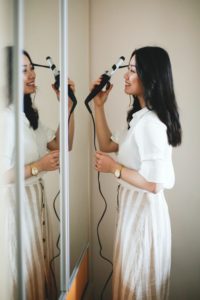Hair loss is an upsetting and surprisingly common condition affecting an increasing number of women. Due to a combination of hormonal changes, stress and illness, over 30 million women in the US will experience some form of hair loss at one point in their lives.
Hair loss becomes a problem when it is persistent and prolonged. Self-treating hair loss can be a drawn-out and frustrating process, without the proper tools and knowledge to inform a successful approach.
Discovering the underlying causes of women’s hair loss
The very first step when dealing with hair loss is to determine what type of hair loss you are experiencing, and why it is happening. Skipping this step can cause a costly, time-consuming and unproductive journey to establishing the root cause of hair loss – all of which wastes valuable time that could be spent pursuing an effective route to remedy it.
 Some lifestyle-based issues that can contribute to or cause hair loss include:
Some lifestyle-based issues that can contribute to or cause hair loss include:
*Poor diet
*Smoking
*Alcohol consumption
*Being overweight
*Not eating enough
*Chemical hair treatments and products
But female hair loss can also be due to some medical conditions and situations, such as:
*Pregnancy
*Hormonal changes due to menopause or
*Diabetes
*PCOS and thyroid disorders
*Medications and treatments such as chemotherapy
Dietary changes
Poor diet can be one of the many causes of hair loss in a number of ways. First, malnutrition (through either eating deficient nutrients due to overdependence on processed foods, or undereating) causes a lack of essential vitamins and minerals). Bad habits such as not drinking enough water, overconsumption of alcohol and eating too much sugar can also influence hair health over time. As the body needs the hair on the head the least, it is the first area to lose nutrients for survival. Be sure to eat plenty of protein-rich, fiber-full meals with lots of vegetables, focusing on a whole-foods based diet.
Supplementary support
As mentioned above, certain deficiencies can be behind female hair loss. It’s best to get tested first to ensure that you’re using supplements safely and smartly, however a good hair, skin and nails formula can be a great place to start. Collagen and biotin can also help to support healthy hair growth.
 Toxin-free haircare
Toxin-free haircare
Many commercial shampoos and conditioners contain toxic ingredients that can actually contribute to hair loss, especially over time. Cleaning up your beauty routine is a simple and easy way to combat hair loss – although beware of greenwashing and read labels carefully before purchasing. Common ingredients to avoid include parabens, phthalates and sulfates.
A gentle approach
When styling your hair, taking a careful and gentle approach is recommended if you’re concerned about hair loss or focusing on hair loss prevention. Avoiding chemical processing such as hair dyes, tints and relaxants or perms can prevent pulling and tugging hair at the root, as well as breakage at the ends due to hair becoming dry and brittle. Daily haircare should also be mindful – avoid harsh or excessive brushing and gently detangle hair using fingers or a wide-comb brush before washing.
Ancient wisdom
Ayurvedic hair rituals can help to stimulate hair growth through nourishing and supporting the scalp and strands. Incorporating weekly hair masks and regular scalp oiling and massage is a great way to promote the growth of healthy new hair and ensure the scalp is receiving all the nutrients it needs.






